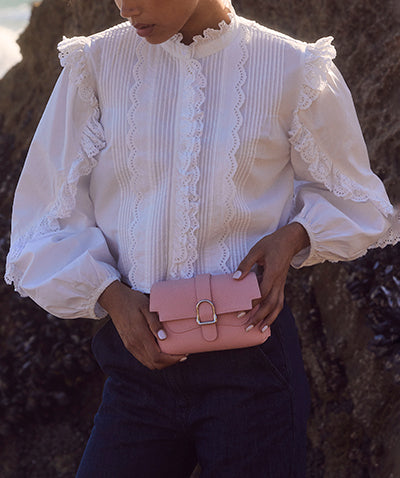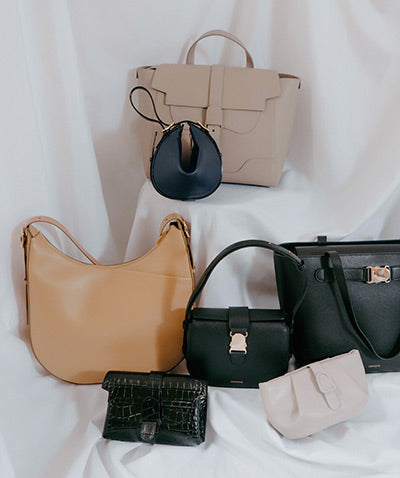Gift Note Edit
${ cartNote }
${ GWbtnTxt() }
Add offer code at checkout.
Shipping
Free
Subtotal
${ formatMoney(cart.total_price) }
Due Today
$0


See details.
Recycled Fashion: A Beginner's Guide
Sustainable fashion is no longer a buzzword limited to a niche subsection of conscious consumerism. Sustainability is at the forefront of fashion, as more consumers push back against wasteful overproduction practices that produce as much as 11.3 million tons of textile waste a year.
Brands are taking notice – not just for their customers, but for the planet – and are taking necessary change. While there’s no one right way to tackle the question of sustainable fashion, this guide discusses recycled fashion in particular. Read on to discover what it is, why it’s important, and how you can be a mindful consumer.
What is recycled fashion?
Recycled fashion utilizes articles of clothing or accessories that are essentially rebirthed — made new again from formerly used, broken down recycled materials. This eco-friendly form of fashion is bringing new life to unwanted clothing. So instead of the clothes collected in landfills, this is an answer to reducing textile waste and giving it a new life.
What is the difference between sustainable fashion and recycled fashion?
Sustainable fashion is an umbrella term that relates to every part of the production of an item, while recycled fashion refers specifically to utilizing recycled materials in clothing and accessories.
Sustainable fashion takes into account the environmental and socioeconomic impact of the clothing industry. Its goal is carbon neutrality and improved welfare for people, animals, and the planet. Recycling technology and recycled fabrics are a part of this movement.
We now know that a comprehensive approach is key. Therefore, sustainability takes into account ethical manufacturing in a company's supply chain as well as reusing products like plastic bottles and rubber.
6 materials used in recycled fashion
Here are the six most common materials used in recycled fashion:
-
Recycled cotton. This material is made from various scraps of cotton or used cotton garments. Mixed with other materials, you won’t find 100 percent recycled cotton, but recycled cotton is great for recycled clothing.
- Recycled wool. Similar to cotton, recycled wool comes from pre-consumer and post-consumer materials. Similar to cotton, it’s also rarely 100 percent recycled wool. Recycling fibers will almost always result in a hybrid piece, but it can still maintain the integrity of the material while keeping old wool out of landfills.
- Recycled cashmere. The fashion brand Stella McCartney has solely used recycled cashmere for several years. Recycled cashmere is common in knitwear, and it can be just as luxurious.
- Recycled PET plastic. A majority of the recycled plastic incorporated into fashion pieces is polyethylene terephthalate (PET). This material already makes up a lot of the world’s synthetic fibers, and it's completely recyclable, so it makes sense that we reuse these plastics for good.
-
Recycled rubber. From water bottles to portable chargers and sustainable footwear, recycled rubber has a lot of uses. And it’s certainly prevalent in sustainable fashion with comfortable clothing like loungewear, too.
- Recycled leather. With this process, scraps are collected from tanneries and other leather producers to create new leather products. And with sustainable vegan alternatives to leather, like Senreve’s Vegan Terra collection, the groundbreaking plant-based exterior is accompanied by a recycled interior eco-lining. This consists of 100% GRS certified recycled material and 50% made from renewable materials. Plus, it has a soft nappa-like smooth finish.
Examples of brands who recycle fashion
Each brand below is known for both its commitment to sustainability as well recycling textiles. With several options, you’ll have a strong head start to begin your quest for mindful consumerism.
Re/Done
Centered around denim, this vintage brand favors the sturdy fabric for their repurposed creations. Each pair of jeans are manufactured in downtown LA, and the brand has implemented water-conserving methods that do not require intense chemicals. From denim shorts to classic blue jeans, you can find the right match for your style.
SENREVE
At Senreve, sustainability was a priority from the start. A progressive approach to luxury products began with the creation of the first handbag. Since fashion contributes tremendously to global pollution, Senreve was founded on the principle that we could produce handbags responsibly, with more care for our planet.
Through high quality, selecting ethical partners, implementing process innovations, and a commitment to zero waste, the path to sustainable fashion is clear. And Senreve prioritizes using every bit of material in the production process — never burning bags and utilizing excess leather scraps for small leather goods. With these timeless pieces, like a Vegan Midi Maestra, you’ll be able to pass along this convertible handbag to the next generation.
RubyMoon
If you’re looking for sustainable activewear and swimwear, RubyMoon has you covered. Sourced from fishing nets and plastic bottles, the recycled materials of the swimwear collection make a statement about its commitment to cleaning up the world’s beaches. They prioritize ocean preservation and women empowerment, celebrating women entrepreneurs for over a decade.
Fanfare
This sustainable fashion house seeks to transform the public’s perception of wearing and consuming clothing. The British brand is a big player in the upcycling movement that breathes new life into vintage apparel. And they launch one new collection annually.
ASOS Reclaimed Vintage
You’ve probably heard of ASOS, but this big brand is now in the sustainability space with its reclaimed vintage collection. They have a team that sources vintage clothing and also upcycles the pieces for a contemporary twist on classic staples. Upcycling is different from recycled clothing because you’re working with an existing garment to fashion something new instead of completely breaking down the material.
Nube
Nube is another sustainable activewear brand. They manufacture in the U.S. and use recycled materials to reduce waste. Their packaging is plastic-free, also made in the U.S., and made from recycled materials. Plus, you can recycle the packaging as well to keep the eco-friendly train moving.
Organic Basics
The brand may sell basic closet staples, but the thinking and mission behind it are far from basic. They’re another brand that understands the comprehensive approach to sustainability. Therefore, everything from the fabric selection to the partners and factories is all chosen with sustainability at the forefront. They make use of recycled fabrics, plastic bottles, and unwanted clothes to create raw materials for new pieces.
Urban Renewal
Like ASOS, Urban Outfitters is rethinking its responsibility to the environment. Their upcycled section repurposes vintage pieces to once again make something old new again. However, because of this approach to slower fashion that prioritizes unique pieces, the items are in limited supply.
How you can take part in recycled fashion
After your crash course on recycled fashion and the importance of sustainability in clothing and accessories, you’re likely eager to learn more tips and tricks for mindful shopping. Well, here’s how you can make a difference with small yet meaningful changes.
- - Buy previously owned pieces. When you shop secondhand at consignment stores, apps dedicated to thrifting, or your neighborhood thrift store, you never know what gems you’ll stumble upon. This is a fantastic way to add to your wardrobe without succumbing to fast fashion.
- - Shop your closet. We’re all guilty of desperately exclaiming, “But what will I wear?” This sentiment is usually uttered in front of a packed closet, begging for you to return to that forgotten perfect midi skirt. So return to your wardrobe and rediscover your collection. This is a great way to take stock of what you already own, so you can make more mindful purchases in the future.
- - Revamp old duds. Try your hand at upcycling an old pair of blue jeans or salvaging that worn-out denim jacket with a few cool patches. You don’t have to be an accomplished seamstress to carefully cut your jeans into a cute pair of summertime shorts.
- - Shop mindfully. For all purchases, consume with intention. Say goodbye to impulse buying and hello to consideration before hitting the checkout button or running to the department store just because there happens to be a sale. And shop brands that share your values and commitment to sustainability.
- - Invest in quality, not quantity. When you slow down and invest in high-quality pieces, you’ll find yourself more likely to hold onto them for a lot longer than poorly made fast fashion pieces. Don’t fall prey to fads because they come and go, but classics last forever.
Shop for the people and the planet
Recycled fashion is a key component of the many changes the fashion industry desperately needs. For the sake of our planet, the people, and the animals who inhabit it, we must practice what we preach about saving the planet. It’s time to revolutionize an industry that’s contributed significantly to global pollution.
And brands like Senreve are committed to doing the right thing in every step of the production process. Explore the Vegan Terra collection: innovative luxury for the sustainably minded. The faux leather is crafted from plant-based proteins and is 100 percent traceable. These well-made pieces will take you through the various seasons of your life gracefully.

